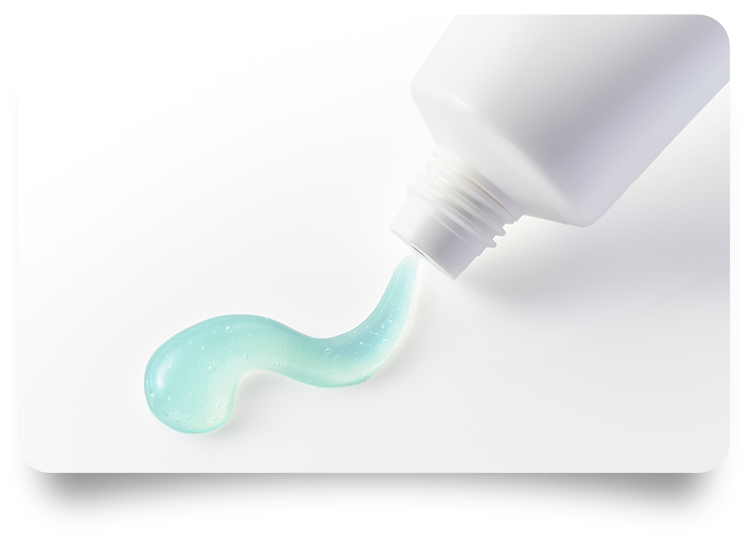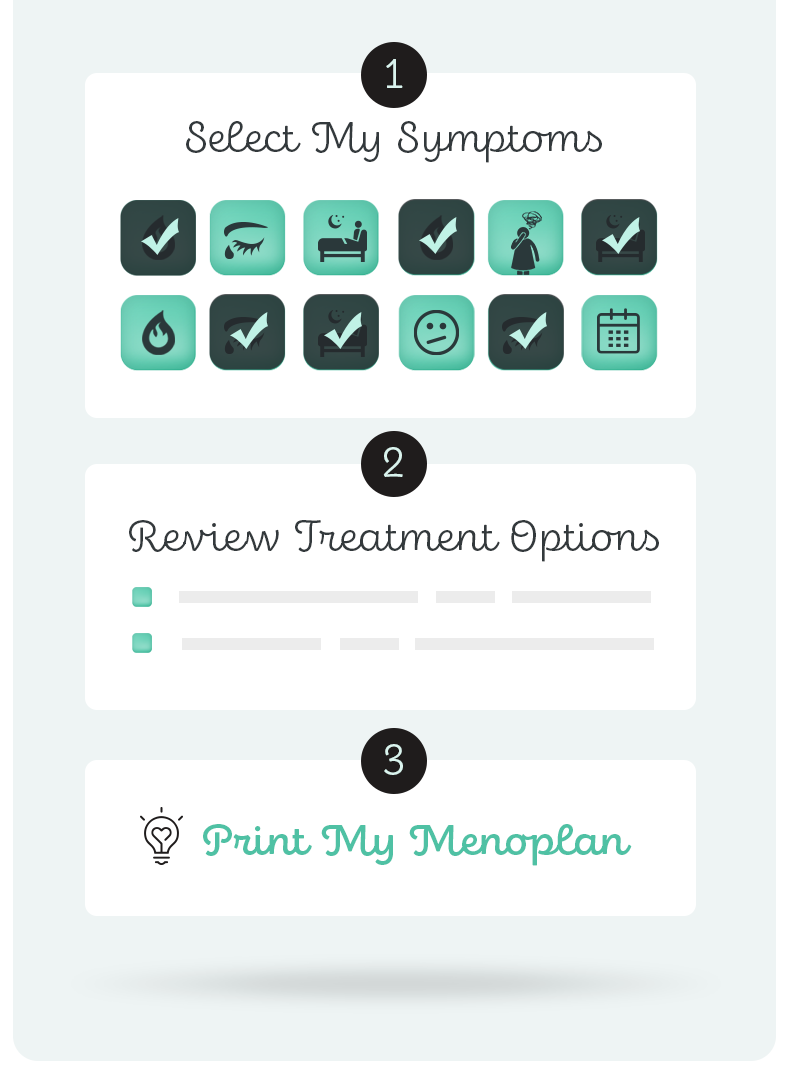Treatments
WHAT IS IT?
Both lubricants and moisturizers are used to help if your vaginal is dry, itchy, and you find sex painful. But they work differently.
Vaginal lubricants are just what their name says. They are used during sex to make things slippery. Vaginal lubricants are good to try if your vagina feels dry during sex, or if you have pain with sexual activity. It can be applied to the opening and inside of the vagina. It can be used before having sex, masturbating, or using a sex toy, to make play and penetration feel better.
Moisturizers are products that are used every two or three days to help with irritation and itching. They plump up the vaginal lining (think hand lotion) and can decrease pain with sex. But moisturizers are absorbed, don’t last as long, and aren’t as wet and slippery as lubricants.
OUR BOTTOM LINE: DOES IT HELP?
YES. Many women find that lubricants and moisturizers are helpful in relieving vaginal symptoms.
There are many products on the market. You might want to try plant-oil based or silicone lubricants first. We recommend you avoid products with fragrance, flavorings, sugars, and products containing other vaginal irritants.

PAIN DURING SEX
Premenopausal (and some postmenopausal) women make natural vaginal lubrication during sex. But as we age our production of this natural lubricant may decrease. The lining of the vagina gets thinner and more fragile. This can make sex more difficult or painful. Vaginal lubricants are used to replace that natural vaginal lubrication and to make the vagina more slippery to ease sexual penetration. Moisturizers add moisture to the vaginal lining.
Vaginal lubricants and moisturizers both help relieve vaginal symptoms. But is important to note that there are many types of lubricants and some may be better than others for vaginal symptoms that occur with menopause.
We recommend using plant-based lubricants such as coconut oil, canola oil, olive oil or any other plant-based oils, or silicone-based lubricants.

VAGINAL PAIN, NOT DURING SEX
The same products that help with painful sex can be used for helping with pain or dryness not related to sexual activity.

LOW SEX DRIVE
These products have no direct effect on libido. But, if you have lost interest in sex because it is painful, use of these products helps make sex more pleasurable. And when sex feels good, your interest may return.
POTENTIAL RISKS & SIDE EFFECTS
Plant oil (like coconut oil) and silicone vaginal lubricants are safe and do not cause health problems. Choose based on your sexual activities or personal preference.
Plant-oil based lubricants are great for genital massage and can be eaten. On the downside, oils can be messy, and stain clothing or sheets. Don’t use them with condoms, because the lubricant can cause the condom to break down.
The advantages of silicone lubricants are that they that they last longer during sex, hold up under water or in the shower, are hypoallergenic, and are safe to use with latex condoms. But don’t use silicone-based lubricants with silicone-based sex toys. They can break down the silicone and change the feel of the toy.
Ingredients in some vaginal lubricants can cause irritation or yeast infections. Choose a lubricant without glycerin, nonoxynol-9, propylene glycol, chlorhexidine gluconate, parabens, sugar, flavoring, or fragrance. Flavored and “warming products” usually contain glycerin which can increase the risk for yeast infections. Products with glycerin also dry out faster.
Vaginal moisturizers cause a clumpy vaginal discharge, and they dry out faster than lubricants.
QUALITY OF LIFE EXPECTATIONS
None
IF I WANT TO TRY THIS TREATMENT WHAT ARE MY NEXT STEPS?
For pain with sexual activity, first try plant oil-based lubricants. You may already have olive, coconut, or canola oil in your pantry.
If you use a condom during sex, try a silicone-based lubricant, which you can get in grocery stores, over the counter at pharmacies, and online.
If you feel vaginal pain, soreness or itching at times other than when having sex try a vaginal moisturizer.
You can also try using moisturizers regularly and add lubricants during sexual activity.
If using lubricants and moisturizers don’t help, or if you don’t like using them, check out the other options to deal with painful sex, vaginal pain not during sex, and low sex drive.
The perfect treatment for menopausal vaginal symptoms has not been developed, mainly because we do not fully understand the cause(s) of the symptoms (MITCHELL, 2017). Postmenopausal women have skin changes of the vagina and vulva related to decreased estrogen – the skin becomes thinner and smoother, with decreased blood flow and aging nerves. These changes are seen on physical examination and are called genitourinary atrophy. But not all women with vaginal signs of atrophy have vaginal symptoms and when they do, the degree of atrophy does not correlate with the severity of symptoms. The estrogen decrease that occurs with menopause may prompt symptoms for some women but replacing local hormones does not always effectively treat vaginal symptoms and women with atrophy on examination may improve with nonhormonal therapies.
In a methodologically sound study of vaginal dryness, a noninflammatory placebo gel was equally effective as vaginal moisturizer, Replens, and a vaginal estrogen tablet (Mitchell, 2018). The easiest and least expensive option is using a lubricant.
Note that guidelines for menopausal vaginal symptom management sometimes suggest use of moisturizers for increasing sexual activity, with very little, and often methodologically weak, evidence to support these recommendations (e.g. NAMS, 2013).
Kagan R, Kellogg-Spadt S, Parish SJ. Practical Treatment Considerations in the Management of Genitourinary Syndrome of Menopause. Drugs Aging. 2019 Oct;36(10):897-908. doi: 10.1007/s40266-019-00700-w. PMID: 31452067; PMCID: PMC6764929.
Laughlin-Tommaso, Shannon K. “Vaginal Dryness after Menopause: How to Treat It?” Mayo Clinic, Mayo Foundation for Medical Education and Research, 12 Oct. 2018, www.mayoclinic.org/vaginal-dryness-after-menopause/expert-answers/faq-20115086.
Lethaby A, Ayeleke R, Roberts H. Local oestrogen for vaginal atrophy in postmenopausal women. Cochrane Database Syst Rev. 2016;2016(8):CD001500. Published 2016 Aug 31. doi:10.1002/14651858.CD001500.pub3. PMID: 27577677
Management of symptomatic vulvovaginal atrophy: 2013 position statement of The North American Menopause Society.Menopause. 2013;20(9):888-904. doi:10.1097/GME.0b013e3182a122c2. PMID: 23985562
Mitchell CM, Reed SD, Diem S, Larson JC, Newton KM, Ensrud KE, LaCroix AZ, Caan B, Guthrie KA. Efficacy of Vaginal Estradiol or Vaginal Moisturizer vs Placebo for Treating Postmenopausal Vulvovaginal Symptoms: A Randomized Clinical Trial. JAMA Intern Med. 2018;178(5):681-690. doi:10.1001/jamainternmed.2018.0116. PMID: 29554173
NAMS. Management of symptomatic vulvovaginal atrophy: 2013 position statement of The North American Menopause Society. Menopause. 2013;20(9):888-904. doi:10.1097/GME.0b013e3182a122c2. PMID: 23985562
Rahn DD, Carberry C, Sanses TV, Mamik MM, Ward RM, Meriwether KV, Olivera CK, Abed H, Balk EM, Murphy M, Society of Gynecologic Surgeons Systematic Review Group. Vaginal estrogen for genitourinary syndrome of menopause: a systematic review. Obstet Gynecol. 2014;124(6):1147-1156. doi:10.1097/AOG.0000000000000526. PMID: 25415166
Sarri G, Davies M, Lumsden MA, Guideline Development Group. Diagnosis and management of menopause: summary of NICE guidance. BMJ. 2015;351:h5746. Published 2015 Nov 12. doi:10.1136/bmj.h5746. PMID: 26563259
Scaccia, Annamarya. “Everything You Need to Know About Vaginal Lubricants.” Healthline, 10 Oct. 2019, www.healthline.com/health/healthy-sex/vaginal-lubricants.
Shulman LP, Portman DJ, Lee WC, Balu S, Joshi AV, Cobden D, Wang Qin, Pashos CL. A retrospective managed care claims data analysis of medication adherence to vaginal estrogen therapy: implications for clinical practice. J Womens Health (Larchmt). 2008;17(4):569-578. doi:10.1089/jwh.2007.0407. PMID: 18429700
Authors: Dr. Susan Reed, Dr. Katherine Newton, & Dr. Leslie Snyder. Last reviewed February 15, 2021



